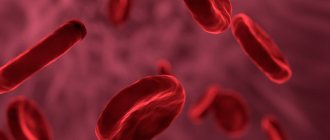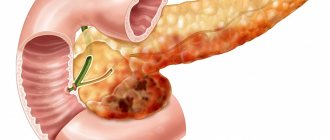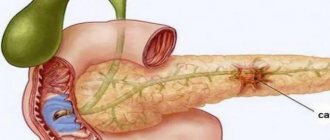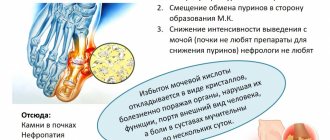Amylase and lipase are digestive enzymes. Their quantity in the bloodstream is used to diagnose the condition of the pancreas if pancreatitis is suspected. Tests can be carried out on the direction of a doctor or at the request of the patient himself, but only a specialist can interpret the results and, if necessary, prescribe treatment. To obtain the most accurate results, special preparation is required before donating blood. For 10 hours before the tests, you must stop eating and avoid significant physical activity and stress.
Lipase: what is it and what are its functions?
Lipase is a water-soluble protein compound produced by several internal human organs at once and is responsible for:
- splitting, fractionating and processing fats;
- absorption by the body of vitamins A, D, E, F, K and fatty acids;
- energy metabolism.
Its function depends on where lipase is produced and there are different types:
- Pancreatic, produced by the pancreas and characterized by the highest concentration of normal lipase in the blood. Entering the digestive organs as an inactive enzyme (prolipase), and interacting with pancreatic enzymes and bile acids, it turns into an active form.
- Hepatic - produced by the liver to absorb chylomicrons and lipoproteins, regulate the level of plasma lipids.
- Gastric lipase is an enzyme produced by the stomach that breaks down fats found in oils, such as tributyrin.
- Lingual - produced by the oral cavity of newborns, helping to separate the fats contained in mother's milk.
In addition, there are pulmonary and leukocyte enzymes.
Pancreatic lipase is of most clinical importance. It ensures timely penetration of lipids, carrying out the decomposition of complex fats emulsified by bile into simple substances.
In the absence of gastrointestinal pathologies, the concentration of the digestive enzyme remains virtually unchanged. When the pancreatic parenchyma is damaged, the tissues of the organ are destroyed, provoking an intense release of lipase into the bloodstream. This happens most often during exacerbations of pancreatitis. It is then that an examination is prescribed to check the level of lipase in the blood.
Taking Pancreatin to compensate for lipase
Enlarge image
In order for food to be completely digested and all the necessary substances to be absorbed by the body, a sufficient amount of enzymes is required:
- lipases;
- amylase;
- trypsin;
- chymotrypsin.
If there are not enough of them, the person requires replacement therapy. One of the most effective drugs is Pancreatin. It helps in the breakdown of carbohydrates, proteins and fats, and is used in the treatment of pancreatitis. With its help, digestion processes are normalized, and the functional state of the gastrointestinal tract is improved.
On a note! Pancreatin is an international nonproprietary name (INN). Therefore, many manufacturers can produce it under the same name, because The name "Pancreatin" does not belong to anyone.
Indications for research
In a biochemical blood test, only the concentration of pancreatic lipase is visible, since other enzymes produced by the lungs, intestines, stomach and liver are concentrated in small quantities. Therefore, biological material is primarily taken for problems with the pancreas.
A lipase blood test is prescribed for the following conditions:
- acute pancreatitis - it is advisable to take material from a vein on the third day of exacerbation, when the maximum lipase value is recorded;
- chronic pancreatitis;
- mumps, or in common parlance mumps, which is dangerous due to the development of complications on the reproductive organs;
- presence of pancreatic tumors;
- pathological changes in the gallbladder and other organs of the digestive tract.
When testing blood for lipase concentration, it is important to test the content of amylase, an enzyme responsible for the breakdown of starches and glycogens.
Lipase test
Lipase is an enzyme that is necessary for the breakdown of fats. The results of a blood test for lipase play an important role in the diagnosis of diseases such as obstruction of the pancreatic duct and pancreatitis in acute or chronic form. Reference values for this enzyme are 13-60 IU/L. If the test results are within these values, this indicates that at the moment the pathological process does not affect the pancreas.
Increased performance
may indicate acute or chronic inflammation, neoplastic changes, traumatic damage to the pancreas, or blockage of its ducts. It is impossible to make an accurate diagnosis and select an effective treatment method based on the results of one test. For this purpose, an examination is prescribed, which may include both laboratory tests and instrumental studies.
Concentration too low
enzyme in the blood may indicate a decrease in the functional activity of the pancreas or cystic fibrosis. Determination of lipase levels has a high diagnostic value in identifying various pancreatic pathologies. The enzyme is produced only by the cells of this organ, so it can be used as a marker of its condition.
When interpreting the results, the patient’s age, clinical picture, results of other studies and other factors are taken into account.
Why is the norm exceeded?
Exceeding the norm of lipase indicates the presence of acute ongoing processes, signaling a disruption in the functioning of the digestive organs, mainly the pancreas.
Diseases that affect the increase in digestive enzymes include:
- exacerbation of the chronic form or primary attacks of acute inflammation of the pancreas;
- mumps in the 3rd week of the process;
- pancreatic necrosis;
- tumors of benign and malignant etiology;
- ulcerative formations of the stomach or duodenum;
- intestinal obstruction;
- development of intestinal necrosis;
- insufficient kidney function;
- gallbladder colic;
- cholestasis complicated by subhepatic hepatitis;
- autoimmune diseases;
- peritonitis;
- obesity.
In addition, an increase in the enzyme (mainly in women) can be provoked by medications used by the patient: indomethacin, direct heparins, sedatives and analgesics. To reduce the concentration of lipase in this case, you just need to stop taking medications.
Medical studies have shown that the increase in lipase in the blood is influenced by fractures of long bones. Scientists explain this phenomenon by the high fat content in these types of bones. When bone material is damaged, fatty deposits enter the bloodstream, causing increased formation of lipase. This pathology is dangerous due to the development of fat embolism.
To achieve accurate analysis, in case of pathologies of the gastrointestinal tract, the study should be carried out after three days from the moment of illness. A high level of digestive enzyme is recorded up to 14 days, gradually decreasing thereafter. Longer persistence of elevated lipase levels is a very unfavorable factor in the disease.
Pancreatin: at the pharmacy
In any pharmacy in Moscow and St. Petersburg you can find a variety of drugs containing lipase . Manufacturers promise an almost instant effect. Or vice versa, you need a lot of pills and take them for a very long time. And many people have long noticed that conventional drugs do not always give the expected effect. There are good drugs in pharmacies, but many people prefer to order dietary supplements on iHerb.com, because... All products are shipped from warehouses in the USA. And here many people from Russia and 150 countries around the world regularly place orders for various herbal supplements and vitamins. When purchasing dietary supplements and sports nutrition from iHerb, you can be confident in its quality and originality. iHerb works only with trusted manufacturers.
All products are purchased, stored and delivered in accordance with all GMP and manufacturer safety requirements. Humidity and temperature conditions are regularly monitored. Absolutely all additives have documents confirming the quality of the products.
What does reduced enzyme concentration mean?
If lipase levels in the blood are lower than normal, this indicates the following dangerous pathologies:
- the formation of a cancerous tumor of all possible localizations, except the pancreas;
- perforated gastric ulcer;
- cystic fibrosis is a genetic pathology that affects the exocrine glands;
- inflammation and possible formation of cysts of the gallbladder and pancreas;
- peritonitis;
- intestinal obstruction;
- surgery to remove the largest digestive organ;
- elevated triglyceride levels associated with predominant consumption of foods high in fat or hereditary hyperlipidemia.
As a rule, a decrease in the enzyme also occurs during the transition from the acute to the chronic stage of pancreatitis.
The above pathologies can only be confirmed by an additional examination of the body and a study of the medical history by a doctor.
The patient’s task is to strictly follow medical prescriptions and undergo timely diagnosis.
Pancreatin: instructions
The enzyme preparation is often used in gastroenterology. It facilitates the digestion of food and promotes better absorption of essential vitamins and microelements in the small intestine. Since the enzymes contained in the product lose activity when exposed to gastric juice, the medicine is available in the form of tablets or capsules coated with a special coating. It is destroyed in the intestines, activating enzymes.
How to use
Enlarge image
How and in what quantities to use the drug depends on the dosage, age of the patient, diagnosis, form of release and other factors. It is better if the prescription is made by a doctor after all the necessary examinations.
Important! Preparations containing digestive enzymes are taken with meals or immediately after meals, unless otherwise indicated in the instructions.
The recommendations for the dosage form of the specific drug used, indications for use and dosage regimen should be strictly followed. The daily dose for an adult is 150,000 units/day. The duration of treatment depends on the disease and can vary from several days and even up to several years.
Pancreatin: reviews
Diseases of the pancreas occur at any age, especially in those people who do not particularly monitor their diet, exceed the portions required by the body and abuse alcohol. Pancreatin is extremely necessary in the first aid kit, people with gastrointestinal problems note in reviews. The effect after administration occurs literally within 30-40 minutes. As a rule, it is prescribed by doctors, because this drug has proven itself well. Take Pancreatin alone or in combination with other medications. Many people have known pancreatin since the times of the USSR.
People with chronic pancreatitis take a course of the drug for prevention 1-2 weeks before the holiday feast. The drug helps improve the functioning of the gastrointestinal tract and also replenishes the deficiency of digestive enzymes.
The main contraindication is individual intolerance, but it occurs in only 1% of people taking Pancreatin. If you follow all the recommendations and follow a diet, this will allow you to avoid surgical intervention and quickly return to your normal life.
On average, in reviews in general, people note the positive role of Pankratin in alleviating the gastrointestinal tract after:
- abundant holiday food;
- food poisoning;
- consuming stale or not very clean products from hand in markets, stalls, etc.
Basic rules for preparing for analysis
The results of the procedure tend to change under the influence of external factors, and not just pathological changes in the internal environment. Therefore, before taking a blood test, you should undergo special training, the features of which are reflected in this table:
| Requirements | Explanation | When to start following a specific recommendation |
| Elimination of certain medications | You should talk to your doctor about the medications you are taking. Some of them that affect the condition of the glands can be excluded during preparation | 1–2 weeks before diagnosis |
| Power stabilization | Almost complete exclusion from the diet of pickles, canned food, spices, smoked meats and fatty foods. Limit the consumption of tonic drinks, including coffee. You should not allow your child to eat sweets before the test; soda and fast food are also prohibited. | Minimum per day |
| Moderation in activity | Heavy physical activity, running, swimming and dancing should be removed from the usual daily routine | In 6–7 days |
| Quitting alcohol | Drinking any alcoholic beverages is prohibited | At least 1–2 days in advance |
Biochemical analysis is carried out on an empty stomach. It is advisable not to undergo radiography and computed tomography several hours before diagnosis. It is imperative to monitor the level of your psychological state before directly visiting the medical center. During a hematological study, the patient should be as calm as possible - stress can modify the components of the blood, so it should be suppressed.
Maintaining digestion and treating enzyme deficiencies
If you have problems with digestion, enzyme preparations (more often called drugs to improve digestion) can help, the main task of which is to compensate for the lack of the body’s own enzymes. It’s not for nothing that this therapy is called “enzyme replacement”. It is critical that the enzyme preparation “mimics” the physiological process as closely as possible.
Today, there are various drugs to improve digestion. How to navigate the variety of means and make the right choice?
An effective enzyme preparation must meet the following criteria5,6:
- have an optimal particle size
- do not break down in the stomach
- quickly activate in the intestines
The drug Creon® meets all these requirements.
To learn more
1) Today, pancreatin minimicrospheres, which are contained only in the drug Creon®5,7, are recognized as the optimal particles. The invention of minimicrospheres was the result of many years of work to improve the effectiveness of enzyme preparations, which left far behind drugs in the form of tablets and capsules with other types of particles inside: pellets, mini-tablets, etc. In addition, Creon® minimicrospheres are produced using patented technology, which prevents other manufacturers from reproducing the same release form.
2) Creon® minimicrospheres are enclosed in a capsule that protects them from the destructive effects of the stomach. But that is not all. Each particle is covered with an acid-resistant coating in order to “reach” the intestines, where its work is necessary, completely intact. At the same time, some other encapsulated drugs can lose up to 30% of their activity6.
3) Creon® begins to work within 15 minutes after entering the intestines, improving digestion and thereby eliminating heaviness and discomfort after eating6.
Creon® has several dosages, including 10,000 IU of lipase - the minimum required dose of lipase to improve digestion in case of dietary errors, eating heavy foods and overeating. To obtain the effect, Creon®10000, like any enzyme preparation, must be taken with every meal - during breakfast, lunch and dinner.









